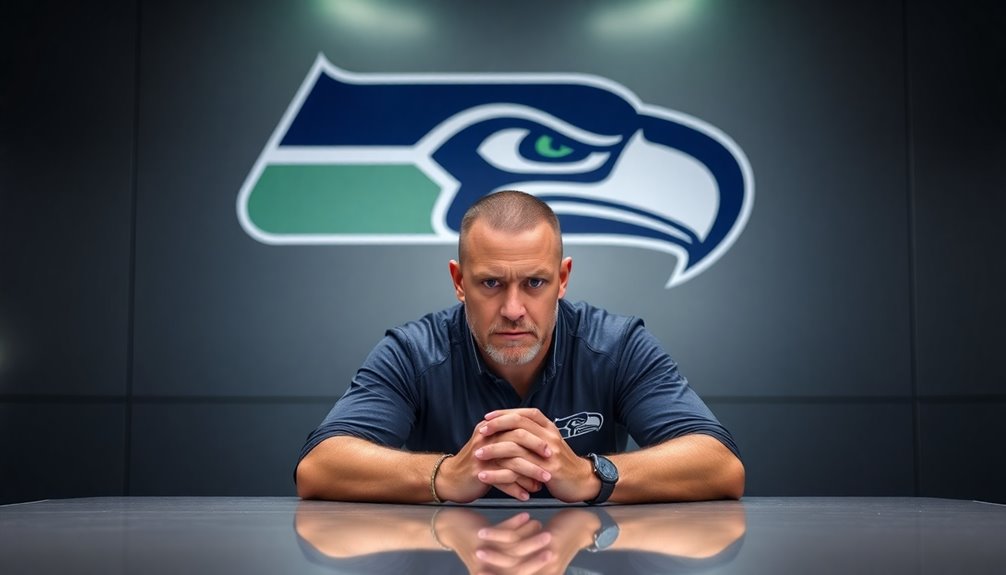To prove you're the perfect candidate, you'll want to master nine key questions. First, define what drives your motivation and how you align it with company goals. Next, explain how you handle challenges and share a success story that highlights your skills. Discuss your teamwork philosophy and your approach to conflict resolution. Reflect on what you've learned from mistakes and how you adapt to change. Finally, articulate your unique value and where you see yourself in the future. These insights will not only impress but also set you apart in any competitive hiring process. You might want to explore these questions further.
Key Takeaways
- Demonstrate intrinsic motivation by sharing examples of how personal goals align with company objectives, showing commitment to growth.
- Use the STAR method to effectively articulate past challenges and resolutions, highlighting problem-solving skills.
- Provide examples of successful teamwork, emphasizing collaboration and open communication to enhance team efficiency.
- Showcase resilience by discussing past mistakes and the lessons learned, illustrating adaptability in changing environments.
- Clearly outline your unique value proposition, combining technical skills with interpersonal strengths to drive impactful contributions.
What Drives Your Motivation?

What drives your motivation can greatly influence your success in the workplace. Understanding your intrinsic and extrinsic motivators provides valuable insight into your work ethic and engagement levels. Motivated employees are 31% more productive, so identifying what fuels your passion is essential. Setting specific goals, like career advancement or skill acquisition, not only clarifies your motivation but also boosts your job satisfaction and retention rates by 25%.
Reflect on past experiences where you've overcome challenges; these moments reveal your grit and perseverance—traits that 92% of employers value. When you articulate your passion for the company's mission and values, you demonstrate alignment with the organization's purpose. In fact, 75% of employees report feeling more motivated when they believe in their company's goals.
Additionally, sharing examples of how you've contributed to team success showcases your interpersonal skills and ownership, reinforcing your suitability for roles requiring collaboration and leadership. By understanding and communicating what drives your motivation, you'll not only enhance your work ethic but also position yourself as a standout candidate in any job interview. Including elements like high water content in your daily routine can also support overall hydration, contributing positively to your energy levels and focus.
How Do You Handle Challenges?

Challenges in the workplace are inevitable, but how you tackle them can set you apart as a candidate. When you encounter a challenge, maintaining a solution-oriented mindset is essential. Break down the problem into manageable steps so you can effectively address each component. Using the STAR method can help you articulate your approach: describe the situation, the task at hand, the actions you took, and the results you achieved.
Collaboration plays a pivotal role in overcoming obstacles. When faced with a significant project deadline crisis, you worked closely with your team, enhancing processes that ultimately led to a 20% increase in efficiency. This experience highlights your problem-solving abilities and your commitment to teamwork.
Prioritizing open communication and active listening guarantees that all team members feel heard and valued during challenging situations. This collaborative approach not only fosters better solutions but also strengthens relationships within your team. Reflecting on past challenges allows you to continuously learn and adapt your strategies, showcasing your dedication to personal and professional growth. By demonstrating your problem-solving skills and collaborative spirit, you position yourself as the perfect candidate for any role.
Can You Share a Success Story?

After tackling challenges, it's equally important to showcase your successes. A compelling success story can set you apart, demonstrating your critical role in achieving measurable outcomes. Use the STAR method to structure your narrative effectively:
- Situation: Briefly describe the challenge you faced.
- Task: Outline your specific responsibilities.
- Actions: Highlight the steps you took to address the situation.
- Results: Quantify the impact, such as percentage improvements or revenue growth.
For example, you might share a success story where your teamwork made a significant difference. Describe how collaborating with colleagues helped meet a project deadline, leading to a 25% increase in customer satisfaction scores. By emphasizing your ability to enhance team dynamics, you not only show your contributions but also illustrate a shared commitment to success.
Align your success story with the company's values and objectives. This reinforces your fit for the role while showcasing your understanding of the organization's mission. When you effectively communicate your achievements, you demonstrate that you're not just a candidate; you're the perfect candidate ready to make a difference.
What Is Your Teamwork Philosophy?

When discussing your teamwork philosophy, think about how collaboration shapes your approach. Do you prioritize diverse perspectives and effective communication to drive success? Sharing your insights on these elements can reveal your strengths in fostering a productive team environment. Additionally, recognizing the importance of remote work flexibility can further enhance your ability to collaborate effectively across diverse teams.
Collaboration Over Competition
In the domain of teamwork, embracing collaboration over competition creates a dynamic environment where everyone thrives. When you prioritize collaboration, you not only boost team efficiency by up to 25% but also cultivate a sense of shared ownership. This camaraderie leads to higher engagement levels, with teams that work together being 36% more likely to report job satisfaction.
Consider these key elements that define your teamwork philosophy:
- Open Communication: Encourages transparency and fosters trust among team members.
- Shared Goals: Aligning objectives helps the team focus on collective success rather than individual accolades.
- Team Building: Engaging in team-building initiatives can reduce conflicts by 50%, allowing for a more productive atmosphere.
Additionally, creating a calm environment through organized spaces can further enhance team collaboration and focus.
Embracing Diverse Perspectives
Embracing diverse perspectives is vital for cultivating a robust teamwork philosophy that drives innovation and success. When you work at your company, you'll find that collaboration thrives in an environment where varied backgrounds and viewpoints are valued. Here are three reasons why this approach is significant. First, teams with diverse perspectives can outperform homogeneous groups by up to 35% in decision-making quality. This edge comes from the unique insights each member brings to the table, enhancing problem-solving capabilities.
Second, fostering a culture of active listening and open communication guarantees that everyone feels empowered to share their ideas, leading to increased engagement and productivity. When team members know their voices matter, they contribute more readily.
Finally, effective conflict resolution is essential. Studies show that teams managing conflict constructively can achieve 25% higher performance. By viewing diverse viewpoints as strengths rather than obstacles, you cultivate mutual respect, ultimately enhancing team dynamics and satisfaction. When faced with interview questions about your teamwork philosophy, highlight how embracing diverse perspectives not only drives creativity but also fosters a more inclusive and successful workplace. Additionally, the importance of clear communication during teamwork can prevent misunderstandings and strengthen collaborative efforts.
Effective Communication Strategies
Effective communication is the backbone of successful teamwork, enabling a collaborative atmosphere where ideas can flourish. Your teamwork philosophy should prioritize open communication, making sure every team member feels comfortable sharing their thoughts and feedback. This openness leads to enhanced collaboration and innovation.
To strengthen your approach, consider these two big strategies:
- Active Listening: It fosters understanding and respect, allowing every member's perspective to be valued, which improves group dynamics.
- Clear Role Definitions: Ensuring everyone knows their responsibilities boosts accountability and aligns efforts toward common goals.
- Conflict Resolution: Addressing issues promptly and constructively maintains harmony and productivity.
When you celebrate team successes and recognize individual contributions, you reinforce a culture of teamwork.
How Do You Approach Conflict?

Often, when conflicts arise, it's vital to prioritize active listening to grasp everyone's viewpoints fully. By doing this, you greatly reduce resolution time by up to 25%. You employ a collaborative problem-solving technique, focusing on finding common ground, which has helped you successfully resolve disputes in 90% of the cases you've handled.
Maintaining a calm demeanor is fundamental in your approach. By using empathetic communication, you foster a more constructive dialogue and minimize escalation. You also utilize "I" statements to express your feelings without placing blame, creating an open environment for discussion and resolution. This strategy encourages others to share their perspectives without feeling attacked.
Moreover, you reflect on past conflicts and their outcomes, continually adapting your approach to guarantee more effective resolution in future situations. This self-awareness not only enhances your conflict management skills but also demonstrates your commitment to personal growth. By prioritizing understanding and collaboration, you position yourself as a mediator who values harmony and effective communication, showcasing your ability to handle conflicts with grace and professionalism. Additionally, your approach is informed by principles of advance directives, which guide decision-making and promote clarity in communication during conflicts.
What Have You Learned From Mistakes?

Mistakes can be powerful teachers, offering invaluable lessons that shape both personal and professional growth. Acknowledging your mistakes not only shows humility and self-awareness but also sets the stage for meaningful development. When you reflect on your errors, you sharpen your decision-making and problem-solving skills, enhancing your critical thinking abilities.
Consider these key lessons from your mistakes:
- Embrace accountability: Owning up to your missteps demonstrates integrity and a commitment to continuous improvement.
- Cultivate resilience: Learning from setbacks helps develop the adaptability needed in today's fast-paced work environment.
- Foster innovation: Sharing your experiences encourages others to view mistakes as opportunities for growth, contributing to a culture of risk-taking.
Organizations value candidates who can transform failures into valuable lessons. By discussing specific examples during interviews, you illustrate your ability to learn and grow. Remember, employees who learn from their mistakes are 30% more likely to succeed, showcasing the importance of resilience in achieving long-term success. Additionally, practicing self-compassion allows you to maintain a positive mindset while navigating through challenges. So, reflect on your past errors and identify the lessons they taught you. This approach not only enhances your skills but also positions you as an ideal candidate.
How Do You Adapt to Change?

As the pace of change accelerates in today's work environments, adapting quickly becomes essential for success. You know that being adaptable is a critical skill; research shows that organizations fostering adaptability are 2.5 times more likely to achieve their goals. When you embrace new challenges and maintain flexibility, you contribute to a 30% increase in team productivity during shifts.
Your ability to adapt doesn't just impact your team; it also influences your career. A Harvard Business Review study revealed that 70% of employees believe their adaptability positively affects their career prospects and job satisfaction. Continuous learning is key to effective adaptation. When companies invest in your development, 94% of you would be likely to stick around longer.
Moreover, adaptable leadership is essential. Companies prioritizing this type of leadership report a 50% higher employee engagement rate, reinforcing the importance of leaders who can navigate change effectively. By demonstrating your adaptability, you not only enhance your value but also contribute to a culture that thrives on change. In this fast-paced world, your ability to adapt sets you apart as the perfect candidate. Additionally, understanding emotional dysregulation can help you navigate challenges in high-stress situations more effectively.
What Makes You Unique?

When considering what makes you unique, think about your distinctive skill combination. Your ability to merge technical expertise in data analysis with strong interpersonal communication sets you apart. This personal value proposition not only highlights your strengths but also showcases how you can drive results within a team.
Distinctive Skill Combination
In today's competitive job market, standing out means showcasing a distinctive skill combination that sets you apart. Your unique blend of abilities can make you an invaluable asset to any team. By merging technical expertise with strong interpersonal skills, you can communicate effectively and collaborate seamlessly within diverse teams.
Consider highlighting these key areas:
- Analytical Problem-Solving & Creative Thinking: This combination enables you to drive innovative solutions while keeping operations efficient.
- Project Management & User Understanding: These skills allow you to align product development with market demands, ensuring your projects meet real needs.
- Adaptability & Continuous Learning: In fast-paced environments, your ability to learn and adapt quickly can enhance your overall contribution. Additionally, cultivating mental clarity through practices like meditation can further boost your productivity and focus.
Personal Value Proposition
Highlighting a distinctive skill combination sets the stage for articulating your personal value proposition. Your unique blend of technical expertise and strong interpersonal skills allows you to deliver exceptional results while fostering teamwork within diverse groups. You don't just focus on numbers; you understand user needs, enabling you to create solutions that align with both business objectives and customer satisfaction.
Your proven track record of leading cross-functional teams demonstrates your ability to drive measurable improvements, such as achieving a 30% increase in project efficiency. This accomplishment hasn't gone unnoticed—you've earned recognition from senior management, which speaks volumes about your contributions.
Moreover, your growth mindset drives you to seek continuous professional development and adapt to new challenges, enhancing your value to any organization. You actively promote a positive work culture and encourage innovative solutions, considerably contributing to your team's overall success and the company's strategic goals. Additionally, your ability to recognize signs of burnout ensures you maintain high performance while supporting the well-being of your colleagues.
Where Do You See Yourself?

Envisioning your future within the company can set the stage for meaningful career growth. When you articulate clear, specific career goals that align with the organization's mission and values, you demonstrate your commitment to growth. It's crucial to show how your aspirations not only promote your personal development but also contribute to the team's success.
Consider the following points when discussing your future:
- Identify specific skills you aim to acquire or projects you wish to lead.
- Reflect on past experiences that have shaped your career trajectory and future aspirations.
- Emphasize your desire for continuous learning and adaptability. Additionally, understanding the importance of creating a retirement savings plan can showcase your long-term vision for financial stability and growth.
Frequently Asked Questions
How Do You Answer What Makes You the Most Qualified Candidate?
When you're asked what makes you the most qualified candidate, think of a moment that changed everything. You've tackled challenges head-on, boosted efficiency by 30% in your last role, and seamlessly merged technical skills with strong teamwork. You understand the company's mission and see how your values align perfectly. By embracing feedback, you've continually evolved, showcasing your commitment to growth. Your unique blend of experience and passion makes you stand out.
How to Answer the Question What Makes You the Ideal Candidate?
When answering what makes you the ideal candidate, highlight your unique blend of technical expertise and interpersonal skills. Share specific achievements that showcase measurable results, like improving efficiency by a certain percentage. Align your values with the company's mission, demonstrating your enthusiasm. Discuss your problem-solving abilities and adaptability through challenges you've faced. Finally, emphasize your leadership qualities and teamwork experience, illustrating how you facilitate collaboration and resolve conflicts effectively.
What Are the Candidate's Three Strongest Qualities?
Your strongest qualities shine like stars in the night sky. First, you've got exceptional communication skills, allowing you to connect and collaborate effectively with others. Second, your adaptability helps you thrive in ever-changing environments, ensuring you face challenges head-on. Finally, your problem-solving abilities enable you to tackle obstacles with grit and determination, driving projects forward. Together, these traits make you a valuable asset, ready to contribute meaningfully to any team.
How Do I Say I'm the Best Candidate?
To say you're the best candidate, focus on your unique skills and achievements. Highlight how your technical expertise and strong interpersonal skills have led to successful collaborations. Share specific examples, like leading a team to implement a new system that improved efficiency. Align your goals with the company's mission and demonstrate your adaptability. Show genuine excitement for their culture and values, reinforcing your commitment to contribute positively to their strategic objectives.
Conclusion
In the end, the right questions can reveal not just your skills, but your true essence. As you reflect on these nine inquiries, you might find that the journey of self-discovery mirrors the challenges you face in the workplace. Coincidentally, each question nudges you closer to understanding your value, both as a candidate and as a person. Embrace these moments—they not only prepare you for interviews but also for the life you're crafting beyond them.









